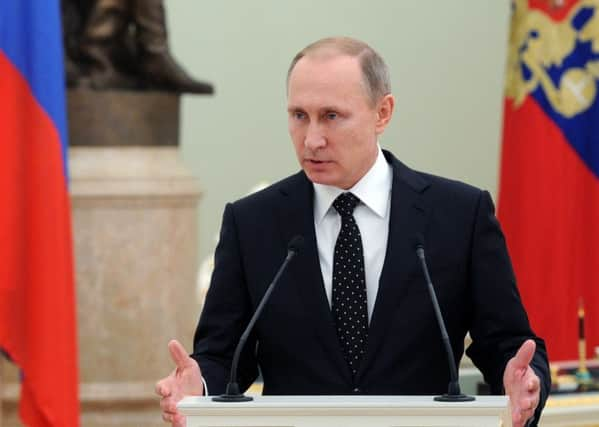Roddy Gow: Looking back could help us better understand Vladimir Putin


What do we really know about this man and the influences that drive him? What do we make of the post-Soviet Union Russian Federation? How should we view a country described by Winston Churchill as “a riddle, wrapped in mystery inside an enigma”?
First we should step back from current and rapidly unfolding events, including the deterioration in relations with Turkey, to consider Scotland’s very interesting and uniquely long-standing relationship with Russia.
Advertisement
Hide AdAdvertisement
Hide AdWriting in his book The Lion and The Bear, John A Duncan of Sketraw observes: “A deep affinity seems to exist between Scots and Russians in terms of national character.
“Perhaps no other nation in Western Europe is so like us. Both peoples dwell in a Northern environment with a difficult climate, both share a common Patron Saint, both are polyethnic and culturally diverse, both had to wage fierce and protracted struggles for self-determination, both exerted an enormous influence over large areas of the globe, and both societies have a strong sense of kinship.
“What one writer describes as “the fiery imagination, incisive intellect, tough stoicism and gentle affection that are aspects of the Scottish character” can be applied to the Russian nature too. Then there is the famous fighting spirit; experts would doubtless agree that few nations make better warriors than Scots and Russians. On the gastronomic plane both prefer simple peasant fare, good (and neat!) grain spirits and plenty of sweets. This closeness, which certainly requires a fuller examination, can account for the tremendous popularity of Ossian, Burns, Scott and Stevenson in Russia. It is also part of the answer why Scots settled there in great numbers and, by and large, felt very much at home”.
This description may seem rather far-fetched and Romantic perhaps in 2015. However, in the reign of Ivan, the Terrible Scottish soldiers made a significant contribution and the first serious military reform was undertaken by a Scot, Alexander Leslie who recruited thousands of men from the West in the 1630s. Between 1650 and 1700 there were an astonishing 15 Russian generals of Scottish origin and two, George Ogilvie and James Bruce, reached the rank of Field Marshal. Peter the Great’s principal advisor was General Patrick Gordon of Auchleucheries, Aberdeen (1635-1699);
A Scotsman, Samuel Greig of Inverkeithing (1735-1788) founded the modern Russian Navy and was made a Full Admiral; his four sons followed in his footsteps and 30 Scots-Russians reached Flag rank before the Imperial Navy’s destruction in 1917. One of Greig’s grandsons was Russia’s minister of finance. Scottish entrepreneurs and engineers, with their proud technological traditions, had ample chances to shine. Charles Gascoigne and Charles Baird created their own industrial kingdoms in St Petersburg and beyond. Baird owned a wharf where in 1815 he devised and launched Russia’s maiden steamship, the Elizaveta.
The principal architect of the Empress Catherine the Great at Tsarkoye Selo was Charles Cameron (1730s – 1812), and others Adam Menelaws and William Hastie also distinguished themselves. Cameron’s crowning achievement were the main Palace in Pavlosk and the Palladian style Bath House and the Cameron Gallery. In the field of literature, it is well known that Robert Burns was adopted as the People’s Poet in Imperial Russia and was recognised as a national hero after the revolution of 1917.
There are countless other examples that highlight the connections which might suggest the Scots should have an understanding of the Russian character and psyche.
There are questions to answer in this game of Russian roulette though. Why, for example, has Russia decided to open its broadcasting operation Sputnik News in Edinburgh, having failed to do so in London. Are there grounds for believing that there is a real détente and that Russia wants to engage and perhaps roll back the damaging sanctions imposed after the taking of Crimea and the actions in the Ukraine. An enormous country spanning multiple time zones, in Vladivostok Russia can be seen as an Asian power and is interested and engaged in countering US influence in the Pacific.
Advertisement
Hide AdAdvertisement
Hide AdIt seems that its Asian neighbours mostly agree that when sitting with Mr Putin they should “sup with a long spoon”. For those of us watching the Asian markets or considering doing business there these are troubling developments to add to the range of economic and political challenges.
l Roddy Gow is chairman and founder of the Asia Scotland Institute